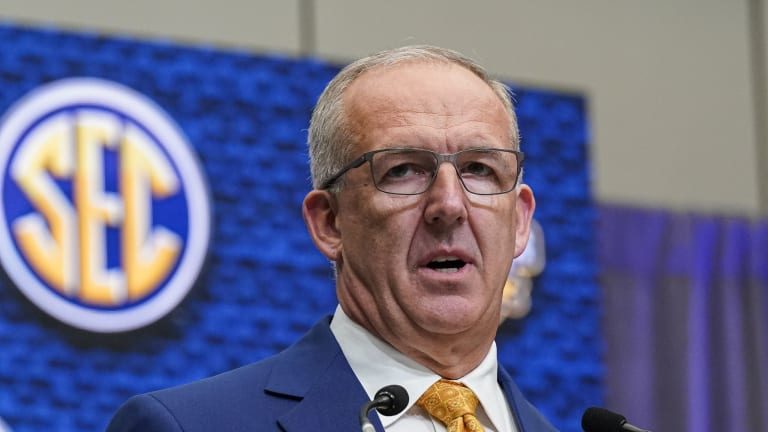
Mr. CFB: Why We Need A 12-team Playoff As Soon As Possible

Last Thursday I got a text message from an assistant to SEC Commissioner Greg Sankey. The commissioner would be dropping by the press box before Saturday’s Chick-fil-A Kickoff game between No. 3 Georgia and No. 11 Oregon.
Sankey does this as a matter of routine to keep the media informed on the comings and goings of the conference. Needless to say, the size and the tenor of the media gaggle that wanted to talk to Sankey grew exponentially when it was announced on Friday that the College Football Playoff would grow from four to 12 teams beginning no later than the 2026 season.
Mississippi State president Mark Keenum, who heads the presidents group of the CFP, added this to the announcement: The presidents have challenged the 10 commissioners and Notre Dame athletics director Jack Swarbrick to explore every possibility of starting the playoff as soon as 2024. And if they can’t the playoff will stay at four for the 2023, 2024, and 2025 seasons.
But the commissioners have to try to make it happen in 2024.
And they need to try hard.
Can it be done? Can the commissioners come up with a formula that satisfies the TV rights holder (ESPN until 2026), the cities and the venues, and the hotels hat will host the games? When on the calendar will the games be played? And what about the Rose Bowl?
There are a lot of moving parts and interconnected contracts in this thing.
The plan calls for the top six conference champions, as chosen by the selection committee, and six at-large teams to make the 12-team field.
The top four seeds a get a bye in the first round. Seeds 5,6,7,and 8 will host first-round games on campus against seeds 9, 10, 11, and 12. No. 5 hosts No. 12, etc. That will be pretty cool.
Four bowls, to be determined, will host the quarterfinal round on or around Jan. 1. Two bowls, again to be determined, will host the semifinals. The national championship game would be at a neutral sight, just as it is now. The CFP currently has its national championship games booked through the 2025 season: Los Angeles (2022), Houston (2023), Atlanta (2024), Miami (2025).
You get the picture. That’s a lot of venues and a lot of hotel rooms that would have to be found and locked in.
So again we ask: Is starting this 12-team playoff in 2024 at all realistic?
It depends on who you ask.
Sankey pulled no punches in his meeting with the media at Mercedes-Benz Stadium. It is going to be very, very hard because there are so many contracts currently in pace through the 2025 regular season.
“If history’s a lesson to help us understand the future, it won’t be easy,” Sankey told the media. “But minds change, motivations change. There’s a bunch of moving parts. That’s where I wish we could have used the last nine months to work on this. We’ll have to accelerate our consideration to make it happen.”
Remember that this same playoff proposal came up for a vote of the commissioners last February. The vote was 8-3 in favor, but the rules require a unanimous vote to change the format before the contract comes to an end. At the time the CFP basically announced there would be no expansion until 2026.
But things changed.
The Big Ten, which was one of the three conferences that voted against expansion, stunned the world by adding UCLA and USC. The Big Ten also signed a new television contract that will pay the conference $7 billion over the next seven years.
With the SEC set to add Texas and Oklahoma in 2024 or 2025, the other three Power Five conferences (ACC, Big 12, Pac-12) started feeling vulnerable. They need more money and they need it now. Every year that goes by without a 12-team playoff is a year where a lot of money was being left on the table.
The current three-game, four-team CFP contract is worth about $470 million a year. An 11-game, 12-team playoff would be well over $1 billion.
“I’m probably not the one to ask what changed,” Sankey said. “Others are probably incentivized because they made expansion decisions that go into effect early next year. They are probably looking at opportunities sooner rather than later.”
Mike Aresco, the commissioner of the American Athletic Conference is a former television executive with ESPN and CBS. His conference stands to fare well under the 12-team format because the top six rated conference champions will get an automatic bid into the playoffs.
One of Aresco’s teams, the Cincinnati Bearcats, became the first team from the Group of Five to reach the CFP last season.
“I absolutely think this can be done early and I think it’s going to be great for college football as a whole,” said Aresco. “Providing access to more teams will strengthen the regular-season schedule because more teams will enter November with a chance to make the playoffs. There will be many more meaningful games.”
Aresco said that college football showed how nimble it could be during the COVID season of 2020. The SEC, for example, put together a 10-game schedule of conference-only opponents which was a big success.
“There are a lot of smart people in that (Commissioner’s) room,” said Aresco. “I really think we can do it.”
The CFP commissioners are scheduled to meet on Thursday in Irving, Tex., to start the process.
Stay tuned.